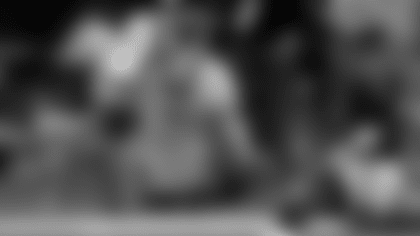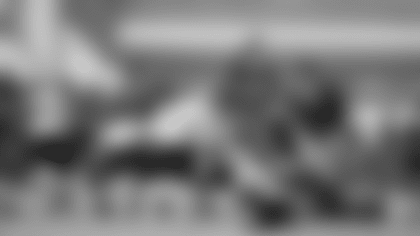Turnover is generally a nasty word in football circles. It is the first word out of a coach's mouth when asked what can most often determine winning and losing. "We had that big fourth quarter turnover that destroyed our chances," Coach X said following his team's loss."
You get the picture.
But for Bill Belichick turnover is what he has done to virtually the entire Patriots roster since taking over the team in February of 2000. Clearly, the team was in need of an overhaul to clear the dead wood and infuse some fresh talent into its bloodstream, but it leads back to a conversation with punter Lee Johnson back in 1999.
Johnson was reflecting back on his long tenure with the Cincinnati Bengals, the organization that gave him his pink slip for his criticism of management, and one of the factors he cited in the team's constant place in the cellar was the annual roster turnover.
To be sure, when you lose, you make changes and often wholesale changes, but can change also disrupt what the team is trying to accomplish? Can it prevent continuity? In Cincinnati, perhaps it did and still does do those things. But let's face it, if the new faces brought in are just new faces, but no better talent-wise than what was there, the team is simply spinning on a treadmill — constantly moving, but never going anywhere.
But this is not Bengals Football Weekly, so it's time to examine the Patriots offseason now that it is, in effect, over. Certainly Belichick did not sit pat on a 5-11 record hoping to get more out of his team. He signed 18 free agents that will descend upon Bryant College this week for the first time. Is he running on the treadmill or is he churning forward even if it's at a slow pace?
Offensively, the Patriots can't be much worse than they were the last 24 games. The output has been dismal at best, but there is reason for hope on that side of the ball. The widely criticized offensive line has finally been revamped, which has to be considered positive in itself. Whether or not second-year players Adrian Klemm and Greg Robinson-Randall can man the left and right tackle spots effectively remains to be seen, but it is nice to see some new, young faces after two seasons where Drew Bledsoe was sacked a combined 100 times and hit hundreds more. With veterans Joe Panos and Mike Compton the likely guards, the group has to be better, but the standard is so low that better may not mean a whole lot.
The running back situation is in a similar boat. Since Curtis Martin left, the treadmill has kept the position running in place (or getting tackled in place). There is a healthy J.R. Redmond, the Robert Edwards comeback attempt and the hopeful resurgence of Antowain Smith to hang your hopes on. That's not exactly a confidence-building group, but if the line is improved, perhaps a member of that trio can do the job.
Terry Glenn's future clouds the wide receiver position, but assuming he's in the mix, the group is vastly better with the added depth of Charles Johnson, Torrance Small, David Patten and Bert Emanuel added to the mix. Based on past production, they have to be better alternatives than Shockmain Davis and Curtis Jackson, who were often the third and fourth receivers on the field last year.
Defensively, the line is very thin and the linebacking corps not much deeper. So if the offense is moving forward, perhaps the defense is stepping back a bit. Richard Seymour provides fresh hope up front and will play alongside an uninspiring, but experienced group of veterans. At linebacker, Ted Johnson and Andy Katzenmoyer must overcome injury questions and Mike Vrabel must prove he can be a starter. The secondary should be much better, but how long can it cover without a pass rush?
Other than the aforementioned turnovers, the two most important ingredients for a winner may be running the ball offensively and stopping the run defensively. Those two areas could be the biggest problems for the Patriots in 2001. That doesn't bode well for a team that signed 18 new players after a 5-11 season.
This is where Belichick comes in. Last year, he provided fresh blood for a group of players that saw things breaking down under Pete Carroll. The players said all the right things about their new head coach. They stressed his genius qualities and their belief in his ability. But how long will they stay on board if things don't turn around quickly in the standings? Can he simply keep changing the faces?
It would be moronic to question Belichick's ability to game plan and plot Xs and Os. He came to New England with the reputation of being a master in that area. But this year's team must avoid the ridiculous letdowns suffered in Chicago and Cleveland last year, games from which they may as well stayed home. How can a team on the losing end most weeks suffer a letdown against anybody?
The biggest area of concern surrounding Belichick's ability to win has to be his personality. While he clearly isn't the sinister demon he was portrayed as after his five years in Cleveland, he simply isn't a charismatic, win-one-for-the-Gipper kind of motivational speaker. Now that is hardly necessary for winning football games on a weekly basis, but it can be helpful in getting a team over the hump in tight situations. After all, there is a reason that some coaches develop that reputation and it only comes when winning is in the equation. Perhaps Belichick gets that done in a way not obvious to observers, which is something time will eventually show one way or the other.
Belichick deserves credit at this point for at least attempting to make the necessary roster changes while also avoiding change simply for the sake of it. Without the salary cap space to bring in an up-and-coming star, he shopped for players with experience, a solid work ethic and decent character. He hopes those elements are the essential parts to avoiding the miserable efforts given against the Browns and Bears last year — losses that demonstrated a lack of character and leadership in the locker room. The additions will almost certainly lead to more consistent play on special teams where youth is often asked to perform tasks it's not ready to perform at the necessary level.
It is training camp No. 2 for Belichick who is clearly engineering a work in progress. He stressed in the offseason that he added more than he subtracted, which he wouldn't have said last summer. But will the additions perform as Bobby Hamilton did in 2000 or more like Eric Bjornson? Will his labor provide fruit or just some weeds to be pulled out to ready the garden to be turned over again next year?
In the pages that follow, Patriots Football Weekly will take a closer look at each position to provide an overview of what to expect in 2001. It's time to lock and load; the 2001 football season is upon us.
















